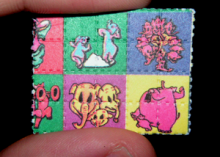Article
A mind-altering substance that induces a state of heightened awareness and perception, often accompanied by hallucinations. Psychedelic plants such as peyote, which is native to Mexico and the southwestern U.S., were traditionally used in indigenous cultures as part of spiritual rituals, aiding in vision quests or healing ceremonies. LSD, also known as acid, one of the most commonly used synthetic psychedelic drugs, was developed in 1938 in Switzerland, and reached a height in popularity in the 1960s and '70s as the drug of choice of the hippie subculture in Europe and the U.S. A synthetic form of the active chemicals of the peyote cactus, LSD is exponentially more powerful than peyote or other plant-based psychedelics, and is considered a dangerous, illegal substance. Consequently, many other natural and synthetic substances that induce similar effects to LSD have been outlawed by association.
"A blotter, or sheet, of LSD-laced stamps illustrated with the psychedelic dream sequence from the 1941 Disney film Dumbo" by Psychonaught is licensed under Public Domain.
Manuscripts
References
Encyclopedia Britannica Online
2014 Psychedelic drug. http://www.britannica.com/EBchecked/topic/481540/psychedelic-drug, accessed October 7, 2014.

